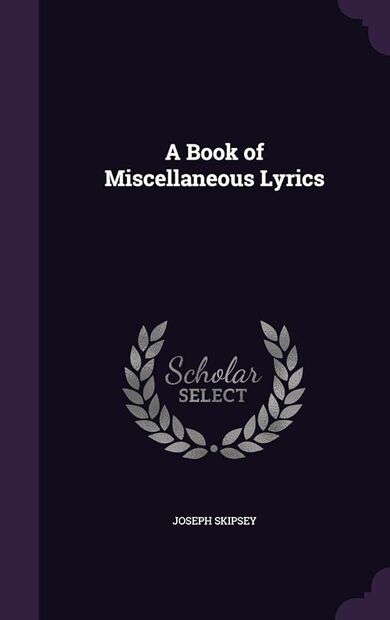The Posy – Gift.
I.
YOU quite mistake the sprite you chase—
I’m of the under, not the upper,
Order of the fairy race;
And cannot go with you to supper.
‘You silly elf, Titania’s self
Will’—Tut, be there? My mirth she
quenches—
And her stiff airs kick me down-stairs
To my dear kitchen cats and wenches.
II.
HE giggled at the thought, and had
He been a dog his tail he’d wriggled,
He was at heart so very glad
At what the little giggler giggled.
‘You giggled? Why? Your thought I’d buy—
The price?' O’er such we’ve never higgled;
’Tis but to task yourself to ask
At what the little giggler giggled.
III.
ANOTHER stave I’ll never rave
Against the rich folk and their riches;
The men, you knave! are good and brave!
The women are the sweetest witches!
‘What’s up now?' Pooh! what’s that to you?
One cannot have a little lunar
Fit, but some one cries out ‘Mum!’
And puts the pipe out of the crooner.
IV.
HA, ha! last night I served you right;
The kick I gave—but I was sorry
I gave it you—but come and view
What will allay your wrath and worry.
‘That posy gay? Well, I dare say—
Who gave it you? A lady?’ Truly!
‘What lady, pray?’ That I will say,
When you have learned your manners duly.
V.
THESE jewels left her very hand;
Were pull’d within her very bowers;
Smell, senseless villain! smell them and
Say didst thou ever smell such flowers?
‘Such flowers?’ the fellow seized his hat—
‘Such flowers?’ he answer’d in derision;
‘Well, I’ve heard questions strange, but that—
I’d better run for—a physician!’
VI.
COME, pretty flowers, and drink my tears;
’Tis well my better reason chided,
Or I had box’d the rascal’s ears,
That so the little dears derided!
My ruth, not ire, the wretch demands;
The magic every cup adorning,
How could he feel?—saw he the hands
That placed them into mine this morning?
VII.
WHAT fancies throng into the mind,
When one upon this posy gazeth;
The more I look, the more I find
Some semblance that one’s ken amazeth.
‘What semblance, man? to what? to whom?’
Go, lack-a-brain, and sweep the stable;
A wooden head must not presume
To chatter at the Muse’s Table!
VIII.
ONE fancy kicks another’s heel;
But let us seize one while it trembles
In act to fly, and make’t reveal
Wherein each bloom her charms resembles.
These violets blue, not filled with dew,
But with my tears—are not these weepers—
‘What would you say? her eyes are grey,
And never flash’d two merrier peepers!’
IX.
ONCE more, sweet Muse, a fancy choose;
Seize by the heels that winged fellow—
And he’ll declare how this her hair—
‘Her hair is brown, that broom is yellow!’
Then that one try, I know he’ll cry
This bean-bloom’s like her lips. 'Sweet
booby!
That runner’s quite a scarlet bright,
Thy lady’s lips are very ruby.’
X.
GO, Musie, go! you like, I know,
To throw a glamour o’er my vision;
And I but want the truth to chant,
And Truth shall do it with precision!
He’ll not aver this rose-bloom’s her,
This lily-bell, he knows not whether,
But he will tell she’s lily-bell
And red, red rose-bloom, both together!
XI.
THESE flowers that so reflect the grace
Of one who is the Queen of Graces!
I’ll pop into my richest vase,
Where I may watch their pretty faces.
And should a fly approach their lips,
Then, Mercy, shield the little sinner;
For if I catch him on the hips,
He’ll never need another dinner!
XII.
ALL things of beauty seek to draw
Unto themselves like things of beauty
In homage to an inner law,
And which to own’s their bounden duty.
So deems my nose—this beauteous nose!
That out of love, not adulation,
So oft, before this wall-flower, bows,—
Or homage yields to this carnation.
XIII.
COME let me smell thee, lily-bell;
Another smell, my silver lily!
And thou, sweet rose, come to my nose—
Ah, whence those feelings, soft and silly?
She smell’s you so! the lady? No?
I know she did; her charming nosy
Drew nectar up from every cup,
Before she handed me the posy!
XIV.
THESE lovely blooms, their rich perfumes,
And many colours, rich and glorious,
My soul illume, o’er care and gloom
To move a king—a king victorious!
To me things seem, as in a stream,
Or on the person of my idol,
To wear a sheen before unseen,
E’en by the gifted bard of Rydal!
XV.
BLIND as the wretch who mock’d my flowers;
Or rather mock’d their well-won praises,
And swore what came from Eden-bowers,
Were only buttercups and daisies—
As blind was I till—till—A hare!
The thought is off, nor can I win it
Back to—well, to—I declare
This song must end with nothing in it!
XVI.
O, DEAR, dear, dear! what shall I do?
My only thoughts are off, that clearly
Might have express’d the praises due
To one I prize, and prize so dearly!
The wine has vanished, and the lees
To serve up these, would leave one,
undone,
Not of the flock of chick-a-dees,
That chirrup to the folk of London.
XVII.
‘HA, ha! at last you’re fetter’d fast—
Was ever such a daft, gigantic
Zany known on earth, or one
So much the sport of passions frantic?
You kicked me off, with scorn and scoff,
Then quite ignored the Muse romantic’s
Aid, Dame’s brow to crown—and now
You pay the piper for your antics!’
XVIII.
‘WITH Common Sense one might dispense,
But from the Muse’s Table surely
To drive away the merry fay,
The Muse herself, is madness purely?
Then when we dine and drink our wine,
To have served up Truth’s pungent salad’s
Enough to make one’s nerves to shake
Whenever we’d meet our Bag of Ballads!’
XIX.
’TIS quite a treat, as singer knows,
To have to own one’s fairly beaten,
And council’s held among the crows
To learn how soon one may be eaten.
The sparrow-hawks are on the wing—
The magpies, too, in chorus chatter,
And owlets lend their aid to ring
The death-bell of—But that’s no matter!
XX.
MY Song must end; and now I’ll send
It to the critics with this letter:
‘Sir, praise this song, and I’m your friend—
Or if you’d rather—you had better!’
One to my lady fair also
I’ll write, and from the subject borrow
Such fire, that I’ll receive, I know,
Another posy-gift to-morrow.
1886.


